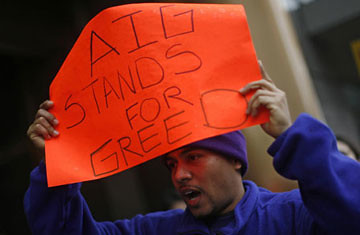
Protests throughout the United States are reflecting the anger of the masses of people against the financial and banking institutions. The United States is heading downward economically despite the trillion of dollars of handouts to the corporations., a photo by Pan-African News Wire File Photos on Flickr.
Updated January 9, 2013, 3:59 p.m. ET
AIG Won't Join Greenberg Lawsuit .
By LESLIE SCISM
Wall Street Journal
American International Group Inc.'s AIG +0.31%directors decided Wednesday not to participate in a lawsuit that accuses the U.S. government of taking advantage of the company in its rescue from the financial crisis.
The suit was filed in 2011 in the U.S. Court of Federal Claims in Washington by Starr International Co., the company headed by AIG's 87-year-old former chief executive, Maurice R. "Hank" Greenberg. It seeks $25 billion in damages for AIG and its shareholders. Starr requested that AIG join it in pursuing the claims, and the insurer's board agreed to hear presentations on the suit during Wednesday's meeting.
The court ruled in July that the case could proceed, after the U.S. government sought to dismiss it.
News of AIG's consideration of the matter this week unleashed a torrent of criticism that the big insurer appeared ungrateful toward taxpayers for the government's rescue effort, one of the biggest of the 2008-09 crisis.
"The AIG Board has determined to refuse Starr's demand in its entirety, and will neither pursue these claims itself nor permit Starr to pursue them in AIG's name," the company said in a release.
"America invested in 62,000 AIG employees, and we kept our promise to rebuild this great company, repay every dollar America invested in us, and deliver a profit to those who put their trust in us," Robert S. "Steve" Miller, chairman of the board, said in the release. "We continue to thank America for its support."
David Boies, who represents Starr, said in an email that his team believes the AIG board's move "is contrary to the shareholders' interests." He said Starr would seek to pursue the claims AIG opted not to back. Whether the AIG board "will be successful in blocking Starr's efforts to recover damages for their shareholders will ultimately be decided" by the court, he said.
Starr has certain other damage claims against the government that are separate from the ones assessed by AIG and are continuing, he added.
Mindful of the potential backlash, a number of AIG directors entered Wednesday's meeting leaning toward rejecting Starr's request to join its suit, two people familiar with their thinking said. Endorsing Starr's action, the people said, could hinder AIG's efforts to rebuild its reputation.
Last month, the U.S. government sold its last remaining shares in AIG, and on Jan. 1 the company began a nationwide advertising campaign thanking U.S. taxpayers and touting its recovery from the crisis.
AIG's directors met for dinner Tuesday night in advance of Wednesday's unusual mock-trial-like session, in which teams of lawyers representing Starr, the U.S. Treasury and the Federal Reserve were expected to make presentations about the matter.
In addition to emails pouring into the company from individuals, numerous politicians in Washington chimed in Tuesday and Wednesday.
Rep. Elijah Cummings, the leading Democrat on the House Committee on Oversight and Government Reform, had called the idea that AIG could join in the suit "an unbelievable insult to our nation's taxpayers" and compared it to "suing the paramedic who just gave you CPR because he didn't give you a pillow."
The lawsuit is a derivative action, which is litigation brought by a shareholder against the directors and management for an alleged failure by management. In short, the suing shareholder claims to act on behalf of the corporation, because directors and management are failing to act for the benefit of the company and shareholders.
In the AIG case, Starr alleges that the government exploited AIG's vulnerable financial position by becoming a controlling lender and shareholder. According to Starr, the government took control of AIG so that it could use the corporation and its assets to provide "backdoor bailouts" to other financial firms. In doing this, the government obtained a nearly 80% equity interest in AIG, and other assets, without due process or just compensation, the suit alleges.
The government denies the accusations, maintaining that AIG voluntarily entered into its rescue package. It also maintains that neither Starr nor AIG informed the government of objections to the equity-interest transaction at the time it occurred, and says Starr's delay of more than three years in bringing suit "is unreasonable."
Write to Leslie Scism at Leslie.scism@wsj.com
No comments:
Post a Comment